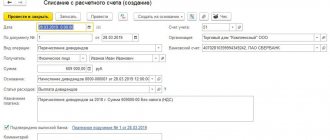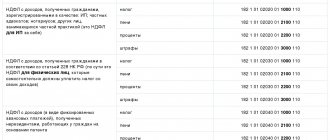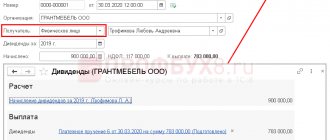Conditions for paying dividends
Relations regarding the payment of dividends are regulated by the following provisions:
- Civil Code of the Russian Federation;
- Law of December 26, 1995 No. 208-FZ “On JSC”;
- Law of 02/08/1998 No. 14-FZ “On LLC”.
| Conditions for paying dividends | Rule of law |
| Joint stock companies | |
| Availability of a decision on the payment of dividends according to the order of their announcement. If a JSC has several categories (types) of shares, then first decisions are made on the payment of dividends on all preferred shares, including those on which dividends on cumulative preferred shares have been accumulated, and only then on ordinary shares. The decision is made by the general meeting of shareholders. The document must define:
| Clause 3 of Art. 42, pp. 2, 3 tbsp. 43 of the Law of December 26, 1995 No. 208-FZ |
No restrictions on dividend payments:
| Clause 4 of Art. 43 of the Law of December 26, 1995 No. 208-FZ |
| If the JSC has a board of directors, in order to pay dividends, recommendations from the board on the amount of dividends are required | Clause 4 of Art. 42, paragraph 1, art. 64 of the Law of December 26, 1995 No. 208-FZ |
| Other conditions. For example, the absence of restrictions established for credit institutions, when it is impossible to make a decision on the distribution of net profit if this leads to a violation of mandatory standards established by the regulator | Article 72 of Law No. 86-FZ of July 10, 2002 |
| Limited Liability Companies | |
| The presence of a decision on the payment of dividends in proportion to the size of the shares of the LLC participants or in another manner provided for by the charter. The decision is made by the general meeting of participants. The document determines the period and procedure for paying dividends. The payment period must not exceed 60 days from the date of the decision on the distribution of profits between the LLC participants | Subparagraphs 1, 2, 3 of Art. 28 of the Law of 02/08/1998 No. 14-FZ |
No restrictions on dividend payments:
| Clause 2 of Art. 29, paragraph 1, art. 30 of the Law of 02/08/1998 No. 14-FZ |
| Other conditions. For example, the absence of restrictions established for credit institutions, when it is impossible to make a decision on the distribution of net profit if this leads to a violation of mandatory standards established by the regulator | Article 72 of Law No. 86-FZ of July 10, 2002 |
Taxation of dividends received from another legal entity
An organization may own part of other legal entities: shares in an LLC or shares in a JSC.
Ideally, such participation should bring income to the company in the form of dividends. Dividends are part of the net profit of an enterprise, distributed among its participants, usually in accordance with their shares. The procedure for determining the timing and methods, as well as the accrual and transfer of dividends to participants and shareholders in LLCs and JSCs is prescribed in the relevant federal laws.
We wrote about the procedure for distributing profits in an LLC here
How to distribute profits in joint-stock companies, read the article
Dividends due to the company are reduced by the amount of tax, which is calculated as follows:
An organization that distributes its net profit among participants (shareholders) is obliged to calculate and pay tax to the budget on these amounts, as stated in paragraph 3 of Art. 275 Tax Code of the Russian Federation. In other words, she is a tax agent. It does not matter whether the dividend payer applies any special tax regime. It also does not matter what special tax regime the recipient has. Tax on dividends must be calculated and paid in any case.
Frequency of dividend payments
If there are no restrictions established by paragraph 2 of Art. 29 of the Law of 02/08/1998 No. 14-FZ, according to paragraph 1 of Art. 28, paragraph 2, art. 29 of Law No. 14-FZ, the frequency of dividend payments to LLC participants can be:
- quarterly;
- half-yearly;
- annual.
The distribution of profit for dividends to the participants of the joint-stock company occurs at a different frequency. They can also be paid only if there are no restrictions set out in paragraph 1 of Art. 42 of the Law of December 26, 1995 No. 208-FZ. According to paragraph 1 of Art. 42 of Law No. 208-FZ, dividends of joint stock companies can be paid:
- quarterly;
- semiannually;
- based on the results of nine months;
- once a year.
The law does not establish any taxation specifics for the payment of interim dividends. They are taxed in the same way as dividends received at the end of the financial year.
It is safer to pay dividends at the end of the year. The fact is that at the end of the year it may turn out that net profit is less than interim dividends already paid. In such a situation, dividends will have to be reclassified as other non-operating income (letter of the Ministry of Finance of the Russian Federation dated April 13, 2016 No. 03-03-06/2/21011) and taxed at a higher tax rate - 20 percent, and not at the rate provided for dividends (13 or 15 percent, depending on the category of dividend recipient).
Postings as of the date of the decision on profit distribution
In the tax accounting (TA) of the recipient, dividends are classified as non-operating income and are taken into account on the date of their actual receipt. For reliable and timely reflection of dividends in accounting (AC), they must be shown when they appeared, that is, they were distributed in favor of the recipient.
Thus, when receiving dividends, it is necessary to recognize income in accounting and accounting records at different times, so in accounting we have time differences.
As for the two options for calculating dividends, methodologists do not have a clear position on this issue. The Ministry of Finance is of the view that it is possible to reflect income in the form of dividends in accounting immediately minus the tax withheld by the tax agent (letter dated December 19, 2006 No. 07-05-06/302). Another point of view is often found in professional judgments and is that dividends should be reflected in the full amount, which is methodologically more correct, because at the time the decision on distribution is made, only the full amount of dividends due becomes known with certainty. At the same time, the amount of tax is not clear and there is no complete certainty that the tax will be transferred by the tax agent. In addition, income tax on dividends is a tax of the recipient company, although it is paid by another person, so it seems necessary to reflect all these “only” and “except” in the accounting.
Postings according to option 1, when we make an accrual for the amount of dividends minus income tax on the date of the decision on profit distribution:
In what other cases is count 76 used, read the article
Subscribe to our newsletter
Yandex.Zen VKontakte Telegram
Postings under option 2, when we accrue the full amount of dividends on the date of the decision on profit distribution:
How to reflect received dividends in tax accounting is described in the typical situation of ConsultantPlus. You will find even more relevant solutions if you sign up for a free trial subscription to K+
Forms of dividend payment
Dividends can be paid in two forms:
- natural;
- monetary.
Most often, dividends are paid in cash, but legislation does not prevent the transfer of property to pay dividends. Payment of dividends in kind is practiced mainly by organizations with a single shareholder and is often used by companies with state participation.
Of the forms of issuance, monetary is preferable, since the permitted property form is equated to sale (letter of the Ministry of Finance of the Russian Federation dated December 17, 2009 No. 03-11-09/405) and is extremely unprofitable from a taxation perspective.
Proceeds from the transfer of property to shareholders (participants) for the payment of dividends (income) are subject to VAT (if this tax is imposed on the property transferred for the payment of dividends).
When calculating personal income tax, the value of property issued to pay dividends includes the amount of VAT (if the transferred property is subject to this tax) (Article 211 of the Tax Code of the Russian Federation).
Income received from the transfer of property for the payment of dividends (income) is subject to income tax in the general manner. Personal income tax, VAT and income tax are calculated based on the value of the property at which it is transferred to shareholders (participants).
Payment of dividends, both in kind and in cash, forms taxable income to the shareholder.
The company paying the dividends acts as a tax agent.
Personal income tax is paid by the person himself
Residents must calculate and pay personal income tax on their own only on dividends received from sources abroad. He will calculate the tax at a rate of 13 percent. He has the right to reduce personal income tax by the tax paid on income in the country of location of the foreign organization. True, he can use this right only if he has concluded an agreement with this country on the avoidance of double taxation. In this case, he will calculate the tax as follows:
| Personal income tax on dividends that a resident received from a foreign organization | = | Dividends that a resident received from a foreign organization | x | 13% | – | The tax that the resident paid at the location of the foreign organization in the country with which a double taxation agreement has been concluded (if there is one) |
If the calculation results in a negative value, then the resident has no right to reimburse the difference from the budget.
This procedure is established by the provisions of subparagraph 1 of paragraph 3 of Article 208, paragraph 1 of Article 209, paragraphs 1 and 2 of Article 214 of the Tax Code of the Russian Federation.
In all other cases, the tax agent must calculate, withhold and pay personal income tax.
Calculation of dividends to founders
The accrual of dividends payable to the founders is reflected in accounting as follows.
The remaining profit after taxation (net profit) is distributed according to the decision of the general meeting of shareholders (participants) of the company or the owner of the organization’s property (clause 1, article 28 of law No. 14-FZ, clauses 1, 2, 3 of article 42 of law no. 208-FZ , paragraphs 1, 2, 2.1 of Article 17 of Law No. 161-FZ). This decision can be made based on the results of the first quarter, half a year, 9 months or based on the results of the financial year.
The allocation of part of the profit of the reporting year to the payment of income to the founders (participants, shareholders, owners of property) of the company (including during interim payments of dividends) is reflected in accounting on the date the general meeting of the company’s participants made a decision on the distribution of net profit (clauses 3, 5, 10 PBU 7/98). At the same time, according to the instructions for using the chart of accounts, approved by Order of the Ministry of Finance of the Russian Federation dated October 31, 2000 No. 94n, the following is recorded:
| Account debit | Account credit |
| 84 “Retained earnings (uncovered loss)” | 75 “Settlements with founders” subaccount 75-2 “Settlements for payment of income” - if the founder is not an employee of the organization 70 “Settlements with personnel for wages” - if the founder is an employee of the organization |
The payer of dividends is obliged to withhold and transfer to the budget income tax and (or) personal income tax.
The types and amounts of taxes withheld from dividends paid, as well as the timing of their payment, depend on the category of the dividend recipient and its legal form. This relationship is shown in the table.
| Recipient of dividends | Type and amount of withholding tax | Tax payment deadlines |
| Legal entity: — Russian; — foreign | Income tax (clause 3 of article 284 of the Tax Code of the Russian Federation): — rate 13 percent (clause 2); — 0 percent rate if the payment is made to the parent company. On the day the decision to pay dividends is made, it must have at least 50 percent of the capital of your organization for at least a year (clause 1, clause 3); — rate 15 percent (clause 3) | No later than the day following the day of payment (clause 2, 4 of Article 287 of the Tax Code of the Russian Federation) |
| Individual: — Russian; — foreign | Personal income tax (Article 224 of the Tax Code of the Russian Federation): — the rate is 13 percent (clause 1) and 15 percent when paying dividends in the amount of 5 million rubles and above (paragraph 2, clause 1); — rate 15 percent (clause 3) | JSC - no later than one month from the date of payment of dividends (clauses 7, 9 of Article 226.1 of the Tax Code of the Russian Federation). LLC - no later than the day following the day of payment of income (clause 6 of Article 226 of the Tax Code of the Russian Federation) |
Dividends from a joint-stock company and income from participation in the authorized capital of an LLC are taxed equally.
If the organization itself does not receive dividends, the tax base is the entire amount due to the member or shareholder.
Tax withholding is reflected in the debit of account 75 (subaccount 75-2) or 70 and the credit of account 68 “Calculations for taxes and fees”.
| Operation | Debit | Credit |
| The recipient of dividends is a legal entity, individual entrepreneur or individual who is not an employee of the organization | ||
| Personal income tax or income tax withheld | 75-2 | 68 |
| Payment of dividends less withholding tax | 75-2 | 50 or 51 |
| Transfer to the budget of withheld tax (profit or personal income tax) | 68 | 51 |
| The recipient of dividends is an employee of the organization | ||
| Personal income tax withheld | 70 | 68 |
| Payment of dividends minus withheld personal income tax | 70 | 50 or 51 |
| Transfer of withheld personal income tax to the budget | 68 | 51 |
Dividends: accrual and payment, accounting entries
Let's look at an example.
By decision of the founders, LLC “Company” pays part of the net profit to three participants on February 15, 2018: JSC “Founder”, Ivanov S.M., Semenov K.S. - each in the amount of 100,000 rubles. All recipients are tax residents of the Russian Federation.
| date | Contents of operation | Sum | Debit | Credit |
| A decision was made to transfer part of the positive financial result to the founders: 100 000 × 3 | 300 000 | 84 | 75 | |
| Personal income tax has been calculated from transfers to individuals: (100 000 × 2) × 13 % | 26 000 | 75 | 68 | |
| Profit tax has been calculated on income to the organization: 100 000 × 13 % | 13 000 | 75 | 68 | |
| Listed by decision on distribution of part of the financial result: 300 000 – 26 000 – 13 000 | 261 000 | 75 | 51 | |
| Withheld personal income tax is transferred to the budget | 26 000 | 68 | 51 | |
| Withheld income tax transferred to the budget | 13 000 | 68 | 51 |
Personal income tax transfers by tax agent
The tax agent must determine personal income tax on dividends separately for each taxpayer and for any payment. This is established in paragraphs 2 and 3 of Article 214 of the Tax Code of the Russian Federation.
When calculating personal income tax, tax agents apply the following rates:
- 13 percent – when paying dividends to a resident;
- 15 percent – when paying dividends to a non-resident. This rate is applied if international treaties on the avoidance of double taxation do not establish a different rate.
This is established by the provisions of Article 7, paragraphs 2 and 3 of Article 214, paragraph 1 and paragraph 2 of paragraph 3 of Article 224 of the Tax Code of the Russian Federation.
For information about who acts as a tax agent when paying dividends, see the reference table.
Situation: is it necessary to withhold personal income tax when paying dividends to a participant (shareholder) of a company who is an entrepreneur?
Yes need.
After all, the legislation does not provide for any exceptions in relation to the recipient of dividends - an entrepreneur. When paying dividends, the organization must fulfill the duties of a tax agent. Including withholding personal income tax. Therefore, when paying dividends to an entrepreneur, personal income tax must be withheld from him. This follows from paragraph 3 of Article 214, paragraph 2 of paragraph 3 of Article 224 of the Tax Code of the Russian Federation.
A similar position is reflected in letters of the Ministry of Finance of Russia dated April 10, 2008 No. 03-04-06-01/79 and dated July 13, 2007 No. 03-04-06-01/238.
Situation: is it necessary to withhold personal income tax when paying dividends to the heir of a shareholder (participant)?
Yes need.
This is explained by the fact that it is not the money itself that is inherited, but only the right to receive it. This means that the general rule according to which income received by inheritance is not subject to personal income tax does not apply. Therefore, when paying dividends to the heir of a participant or shareholder, personal income tax must be withheld. This conclusion follows from paragraphs 18 and 58 of Article 217, paragraphs 3 and 4 of Article 214 of the Tax Code of the Russian Federation.
A similar position is reflected in the letter of the Ministry of Finance of Russia dated October 29, 2007 No. 03-04-06-01/363.
Situation: is it necessary to withhold personal income tax if a participant refuses to pay dividends (for example, in favor of an organization)?
Yes need.
After all, despite the fact that the participant did not formally receive the money, he disposed of it - transferred it to the organization. These amounts must be taken into account when determining the tax base, as well as those that were paid. This is directly indicated in paragraph 1 of Article 210 of the Tax Code of the Russian Federation.
In this case, it is considered that the income was actually received on the date when the money was transferred to the accounts of third parties by order of the participant. But in this situation the money is not transferred anywhere. Therefore, the day when the participant refused dividends in favor of the organization is considered the date of receipt of this income (subclause 1, clause 1, article 223 of the Tax Code of the Russian Federation).
At the same time, on a general basis, withhold personal income tax from these amounts (clause 4 of Article 226 of the Tax Code of the Russian Federation).
A similar point of view is reflected in the letter of the Ministry of Finance of Russia dated October 4, 2010 No. 03-04-06/2-233.
How can a tax agent calculate personal income tax at a rate of 15 percent?
When calculating personal income tax on non-resident dividends, apply a rate of 15 percent. Do this only if the double tax treaty with the foreign country does not specify different rates. The list of such agreements can be found in the table.
Calculate personal income tax on non-resident dividends using the formula:
| Personal income tax on non-resident dividends (to be withheld) | = | Dividends accrued to a non-resident | x | 15% (tax rate), unless otherwise provided by international treaties |
Such rules are provided for in paragraphs 3 and 4 of Article 214, paragraph 3 of Article 224, paragraph 6 of Article 275 of the Tax Code of the Russian Federation.
An example of calculating personal income tax on dividends accrued to citizens. The organization received income from equity participation in other organizations
At the end of 2015, Alfa JSC received a net profit of RUB 266,000. It includes income from equity participation in other organizations in the amount of 150,000 rubles.
In March 2021, the general meeting of shareholders decided to use the entire amount of net profit received (RUB 266,000) to pay dividends. The authorized capital of the organization is divided into 100 shares. Of these, 60 shares belong to Alpha director A.V. Lvov, and 40 shares - to Iraqi citizen R. Smith (not a tax resident of Russia and an employee of Alpha).
Alpha's accountant made the following entries in the accounting records:
Debit 84 Credit 70 – 159,600 rub. (RUB 266,000: 100 shares * 60 shares) – dividends were accrued to Lvov;
Debit 84 Credit 75-2 – 106,400 rub. (RUB 266,000: 100 shares * 40 shares) – dividends were accrued to Smith.
The Alpha accountant calculated the personal income tax on the founders’ income as follows:
– from Smith’s income (non-resident): 106,400 rubles. * 15% = 15,960 rub. (there is no agreement concluded between Russia and Iraq on the avoidance of double taxation on personal income tax);
– from the income of Lviv (resident): (266,000 rubles * 60%: 266,000 rubles) * (266,000 rubles – 150,000 rubles) * 13% = 9048 rubles.
How can a tax agent calculate personal income tax at a rate of 13 percent?
When calculating personal income tax on resident dividends, apply a rate of 13 percent. When calculating your tax, consider whether your organization received dividends from other companies or not.
When the organization does not have such income, calculate the tax using the formula:
| Personal income tax on dividends (to be withheld) = Dividends accrued to a resident x 13% |
This procedure follows from the provisions of paragraph 3 of Article 214 of the Tax Code of the Russian Federation.
An example of calculating personal income tax on dividends accrued to the founders. The organization did not receive income from equity participation in other organizations
At the end of 2015, Alfa JSC received a net profit of RUB 266,000. On March 5, 2021, the general meeting of shareholders decided to use this amount to pay dividends. Alpha did not receive income from equity participation in other organizations.
Alpha's authorized capital is divided into 100 ordinary shares. Of these, 60 shares belong to Alpha director A.V. Lvov, and 40 shares - to Iraqi citizen R. Smith, who is not a tax resident of Russia and an employee of Alpha.
On March 5, 2021, Alpha’s accountant made the following entries in the accounting records:
Debit 84 Credit 70 – 159,600 rub. (RUB 266,000: 100 shares * 60 shares) – dividends were accrued to Lvov;
Debit 84 Credit 75-2 – 106,400 rub. (RUB 266,000: 100 shares * 40 shares) – dividends were accrued to Smith.
The amount of personal income tax on dividends accrued to Lvov is: RUB 159,600. * 13% = 20,748 rub.
There is no agreement concluded between Russia and Iraq on the avoidance of double taxation on personal income tax. Therefore, the amount of personal income tax on income accrued to Smith is equal to: 106,400 rubles. * 15% = 15,960 rub.
If the company received dividends from participation in other organizations in the current or previous years, the procedure for calculating personal income tax will be different. It depends on whether dividends received from participation in other organizations are taken into account when paying participants. If taken into account, then calculate personal income tax in the usual manner.
Well, if, having received income from participation in other organizations, you have not yet paid dividends, then calculate your personal income tax as follows:
| Personal income tax on dividends (to be withheld) | = | Dividends accrued to a resident | : | Dividends to be distributed to all recipients | x | Dividends to be distributed to all recipients | – | Dividends received by the tax agent | x | 13% |
There is no need to withhold personal income tax only if the dividends your organization received are greater than or equal to those paid to the participant.
This procedure is provided for in paragraph 2 of paragraph 2 of Article 210 and paragraph 5 of Article 275 of the Tax Code of the Russian Federation.
When determining the indicator “dividends received by the tax agent,” take into account such income minus previously withheld tax (letter of the Ministry of Finance of Russia dated February 6, 2008 No. 03-03-06/1/82).
Take into account receipts from both Russian organizations and foreign ones. And don’t take into account only dividends that are taxed at a rate of 0 percent (letters of the Ministry of Finance of Russia dated October 31, 2012 No. 03-08-05 and dated February 19, 2008 No. 03-03-06/1/114).
Situation: at what rate (9 or 13%) should personal income tax be withheld from dividends paid in 2021, but distributed in previous years?
For dividends paid on January 1, 2021 and later, personal income tax is withheld at a rate of 13 percent. That is, according to the one that has been in effect since 2021. It does not matter for what period these dividends are for.
You can distribute profits for 2015 or earlier periods at any time. There are no legal restrictions for this. This conclusion follows from the provisions of Article 43 of the Tax Code of the Russian Federation, Article 28 of the Law of February 8, 1998 No. 14-FZ and Article 42 of the Law of December 26, 1995 No. 208-FZ and is confirmed by letters of the Ministry of Finance of Russia dated March 20, 2012 No. 03-03-06/1/133, dated April 6, 2010 No. 03-03-06/1/235.
In any case, the tax rate must be applied to the one in effect on the date the income was received. And in the situation under consideration, such a date is considered to be the day when dividends were paid to the participant (founder). That is, this is the day when the money was transferred to the participant’s bank account, or the day when you issued dividends from the cash register. The date of dividend distribution does not matter here. Therefore, if the payment is dated 2021, then personal income tax will have to be calculated, withheld and transferred to the budget at a rate of 13 percent.
This procedure follows from the provisions established by subparagraph 1 of paragraph 1 of Article 208, paragraph 2 of paragraph 2 of Article 210, paragraph 3 of Article 214, subparagraphs 1 and 2 of paragraph 1 of Article 223 and paragraph 1 of Article 224 of the Tax Code of the Russian Federation. Similar clarifications are contained in the letter of the Ministry of Finance of Russia dated March 16, 2015 No. 03-04-06/13962.






